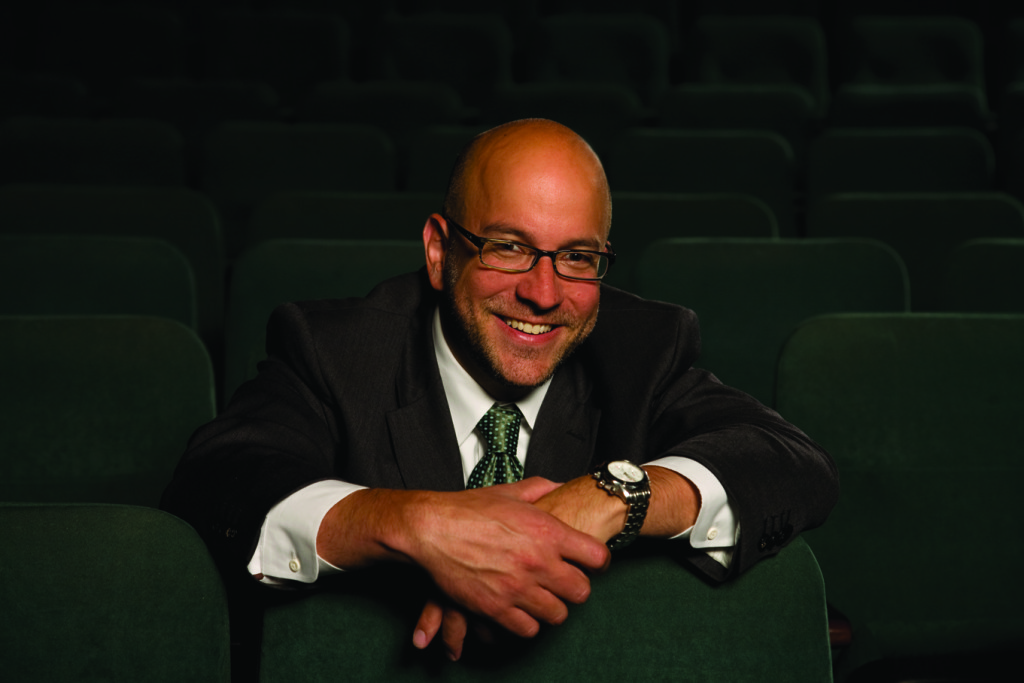By Paul Horsley
So let’s say you’re a major theater company and you need a big splash for your new season, but your building is under construction until late fall. What to do? In a word: innovate. Stephen Sondheim’s Sunday in the Park with George, a multidimensional reflection on the nature of art and creativity, uses an epochal painting by Georges Seurat as a jumping-off point, and as a source for dazzling visual coups de théâter.
So what better place for the Kansas City Repertory Theatre to perform the Pulitzer Prize-winning musical than the Nelson-Atkins Museum of Art, which not only has Seurats of its own but also contains an auditorium that is just right for the type of intimate theater the Rep is famous for? On September 11th the company, in partnership with the Nelson, opens its season with Sondheim’s and James Lapine’s milestone work, performed in the Atkins Auditorium and directed by Rep Artistic Director Eric Rosen. (The Rep’s Spencer Theatre at UMKC, which is currently undergoing a $5.5 million renovation, will open in November with the company’s annual production of A Christmas Carol.)

KC Rep Artistic Director Eric Rosen will direct ‘Sunday in the Park.’
“I can’t imagine a more meaningful environment,” Eric said of the Atkins Auditorium. “It’s like being ‘site-specific’: We’re in a museum, we’re not pretending to be in a theater. So we’re able to focus on art and making art, on canvasses and what it takes to create art.” Since its appearance on Broadway in 1984, Sunday in the Park has been recognized as one of the most inventive works in contemporary theater. Its first half recounts Seurat’s travails in creating his 7’ x 10’ “A Sunday Afternoon on the Island of La Grande Jatte,” which hangs in the Art Institute of Chicago and was a favorite of Eric’s when he was working at the Goodman Theatre (whose old space was adjacent to that city’s museum).
“I love that painting so much,” Eric said of the pointillistic masterpiece, first unveiled in 1886. “I would go there on my lunch breaks and just sit and stare at it.” (The Nelson also owns a significant study for Seurat’s companion-piece “Bathers at Asnières,” a painting representing a different view of the same afternoon scene.) Act II of Sunday in the Park fast-forwards a century to introduce us to Seurat’s great-grandson, also named George, who is stuck at an artistic crossroads and encouraged to follow his dream by his grandmother, the elder painter’s daughter (in the song “Move On”).
“I think it is as near perfect a musical as we have from the last 50 years,” Eric said, “incredibly smart, incredibly moving.” Act I deals with an artist who died at age 31 while “the Second Act fleshes out the idea of what it means to be an artist: not just the tortured young visionary but an artist who faces a mid-life crisis and has nothing else to say. … How does an artist mature and wrestle with the fear of voicelessness?”

Chicago Art Institute owns Seurat’s ‘A Sunday Afternoon,’ but one of the treasures of KC’s museum is a study for Seurat’s famous ‘companion painting.’ Used by permission. Georges Seurat, Study for ‘Bathers at Asnières.’ 1883. Oil on panel. The Nelson-Atkins Museum of Art. Purchase: William Rockhill Nelson Trust, 33-15/3.
Sunday in the Park was not just a huge breakthrough for the composer-lyricist and author Lapine, Eric said (“it’s the first Sondheim musical that sounded like Sondheim”), it was also a sort of autobiographical description of the early-career Sondheim and of the still-innovative artist in his mid-50s. “Sondheim was both George of the First Act and George of the Second Act,” Eric said, “the one searching for a great expression … and then dying, the other having said something great and then figuring out how to move on to the next thing.”
Sunday in the Park with George, which stars Sara Jean Ford and Claybourne Elder, runs September 11th through October 4th at Atkins Auditorium. Call 816-235-2700 or go to kcrep.org. For information about associated Nelson events see nelson-atkins.org.
At top: Sara Jean Ford, who plays the part of Dot / Photo courtesy KC Rep.
[slider_pro id=”2″]
[slider_pro id=”3″]